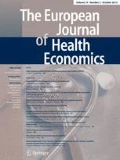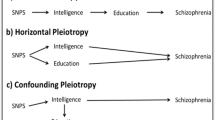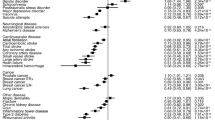Abstract
We investigate the association between education and disease-specific medications in old age, prescribed by medical doctors, accounting for confounders and how this association is shaped by intelligence. We use administrative data on men including prescribed medication records. To account for endogeneity of education we estimate a structural model, consisting of (i) an ordered probit for educational attainment, (ii) a Gompertz mortality model for survival up to old age, (iii) a probit model for prescribed medications in old age, (iv) a measurement system using IQ tests to identify latent intelligence. The results suggest a strong effect of education on prescribed medications for most medications, except for prescribed medication for cardiac diseases and for depression and anxiety.




Similar content being viewed by others
Data Availability
Our analyses were carried out under specific confidentiality agreement with Statistics Netherlands to access non-public national mortality data linked by Statistics Netherlands to our military examination records. For additional analyses by bona-fide researchers, we can provide guidance on how they could also obtain privileged access to these data under special confidentiality agreements. We are also willing to share all scripts that were used in producing our results. Data requests can be submitted to the Centre for policy statistics of Statistics Netherlands: Centrum voor Beleidsstatistiek: microdata@CBS.nl. Data requests should refer to project 7012.
Notes
We cannot distinguish between type-1 and type-2 diabetes. As type-1 diabetes usually occurs early in life there may be simultaneous impacts between diabetes and education. However, this issue should be negligible as type-2 diabetes is much more common than type-1 in adults.
Note that for identification we need at least three different intelligence tests and to restrict one of the intelligence parameters in the IQ equations, \(\zeta\) in (4), to one.
Gaussian quadrature is a numerical integration method based on Hermite polynomials. It provides an efficient approximation for evaluating indefinite integrals based on normal distributions. The STATA estimation programs are available upon request.
References
Alessie, R., Angelini, V., van den Berg, G.J., Mierau, J.O., Viluma, L.: Economic conditions at birth and cardiovascular disease risk in adulthood: evidence from post-1950 cohorts. Soc. Sci. Med. 224, 77–84 (2019)
Amin, V., Behrman, J.R., Kohler, H.P.: Schooling has smaller or insignificant effects on adult health in the US than suggested by cross-sectional associations: New estimates using relatively large samples of identical twins. Soc. Sci. Med. 127, 181–189 (2015)
Anderson, T., Rubin, H.: Statistical inference in factor analysis. In: J. Neyman (Ed.), Proceedings of the third berkely symposium mathematical statistics and probability, Berkeley, pp. 111–150. University of California Press (1956)
Arendt, J.N.: Does education cause better health? A panel data analysis using school reforms for identification. Econ. Educ. Rev. 24, 149–160 (2005)
Auld, Christopher, Nirmal Sidhu, M.: Schooling, cognitive ability, and health. Health Econ. 14, 1019–1034 (2005)
Batty, G., David, G., Deary, I.J., Gottfredson, L.S.: Premorbid (early life) IQ and later mortality risk: Systematic review. Ann. Epidemiol. 17(4), 278–288 (2007)
Batty, G., David, G., Wennerstad, K.M., Smith, G.D., Gunnell, D., Deary, I., Tynelius, P., Rasmussen, F.: IQ in early adulthood and mortality by middle age: Cohort study of 1 million Swedish men. Epidemiology 20(1), 100–109 (2009)
Batty, G.D., Gale, C.R., Tynelius, P., Deary, I.J., Rasmussen, F.: IQ in early adulthood, socioeconomic position, and unintentional injury mortality by middle age: A cohort study of more than 1 million Swedish men. Am. J. Epidemiol. 169(5), 606–615 (2009)
Batty, G.D., Wennerstad, K.M., Smith, G.D., Gunnell, D., Deary, I.J., Tynelius, P., Rasmussen, F.: IQ in early adulthood and later cancer risk: Cohort study of one million Swedish men. Ann. Oncol. 18(1), 21–28 (2007)
Begerow, T., Jürges, H.: Does compulsory schooling affect health? Evidence from ambulatory claims data. Eur. J. Health Econ. 23(6), 953–968 (2022)
Bijl, R.V., de Graaf, R., Hiripi, E., Kessler, R.C., Kohn, R., Offord, D.R., Ustun, T.B., Vicente, B., Vollebergh, W.A.M., Walters, E.E., Wittchen, H.-U.: The prevalence of treated and untreated mental disorders in five countries. Health Affairs. 22:122–133
Bijwaard, G.E., Jones, A.M.: An IPW estimator for mediation effects in hazard models: with an application to schooling, cognitive ability and mortality. Empir. Econ. 57(1), 129–175 (2019)
Bijwaard, G.E., Myrskylä, M., Tynelius, P.: Education, cognitive ability and cause-specific mortality: a structural approach. Popul. Stud. 73(2), 217–232 (2019)
Bijwaard, G.E., Myrskylä, M., Tynelius, P., Rasmussen, F.: Educational gains in cause-specific mortality: Accounting for cognitive ability and family-level confounders using propensity score weighting. Soc. Sci. Med. 184, 49–56 (2017)
Bijwaard, G.E., van Kippersluis, H.: Efficiency of health investment: education or intelligence? Health Econ. 25, 1056–1072 (2016)
Bijwaard, G.E., van Kippersluis, H., Veenman, J.: Education and health: The role of cognitive ability. J. Health Econ. 42, 29–43 (2015)
Bijwaard, G.E., van Poppel, F., Ekamper, P., Lumey, L.: Gains in life expectancy associated with higher education in men. PloS One 10, e0141200 (2015)
Boardman, J.D., Fletcher, J.M.: To cause or not to cause? That is the question, but identical twins might not have all of the answers. Soc. Sci. Med. 127, 198–200 (2015)
Bound, J., Solon, G.: Double trouble: On the value of twins-based estimation of the return to schooling. Econ. Educ. Rev. 18, 169–182 (1999)
Brown, M.I., Wai, J., Chabris, C.F.: Can you ever be too smart for your own good? comparing linear and nonlinear effects of cognitive ability on life outcomes. Perspect. Psychol. Sci. 16, 1337–1359 (2021)
Calvin, C.M., Deary, I.J., Fenton, C., Roberts, B.A., Der, G., Leckenby, N., Batty, G.D.: Intelligence in youth and all-cause-mortality: Systematic review with meta-analysis. Int. J. Epidemiol. 40(3), 626–640 (2011)
Carroll, J.B.: Human cognitive abilities: A survey of factor-analytic studies. Cambridge University Press, Cambridge (1993)
Clark, D., Royer, H.: The effect of education on adult mortality and health: Evidence from Britain. Am. Econ. Rev. 103, 2087–2120 (2013)
Conti, G., Heckman, J.J.: Understanding the early origins of the education-health gradient: A framework that can also be applied to analyze gene-environment interactions. Perspect. Psychol. Sci. 5, 585–605 (2010)
Conti, G., Heckman, J.J., Urzua, S.: The education-health gradient. Am. Econ. Rev. 100, 234–238 (2010)
Cutler, D., Lleras-Muney, A.: “Education and health: evaluating theories and evidence.” In: House James S, Schoeni Robert F, Kaplan George A, Pollack Harold., editors. Making Americans Healthier: Social and Economic Policy as Health Policy. New York: Russell Sage Foundation (2008)
Davies, N.M., Dickson, M., Davey Smith, G., van dan Berg, G.J., Windmeijer, F.: The causal effects of education on health outcomes in the UK Biobank. Nat. Hum. Behav. 2, 117–125 (2018)
Deary, I.J.: Why do intelligent people live longer? Nature 456, 175–176 (2008)
Deary, I.J., Johnson, W.: Intelligence and education: Causal perceptions drive analytic processes and therefore conclusions. Int. J. Epidemiol. 39, 1362–1369 (2010)
Ekamper, P., van Poppel, F., Stein, A., Lumey, L.: Independent and additive association of prenatal famine exposure and intermediary life conditions with adult mortality between age 18–63 years. Soc. Sci. Med. 119, 232–239 (2014)
Fletcher, J.M.: New evidence of the effects of education on health in the US: Compulsory schooling laws revisited. Soc. Sci. Med. 127, 101–107 (2015)
Fujiwara, T., Kawachi, I.: Is education causally related to better health? A twin fixed-effect study in the USA. Int. J. Epidemiol. 38, 1310–1322 (2009)
Goldman, D.P., Smith, J.P.: Can patient self-management help explain the SES health gradient? Proc. Natl. Acad. Sci. 99, 10929–10934 (2002)
Gottfredson, L.: Intelligence: is the epidemiologists’ elusive fundamental cause of social class inequalities in health? J. Person. Soc. Psychol. 86(1), 174–199 (2004)
Haak, W.: Education and training of chemists and technicians in the Netherlands. J. Royal Inst. Chem. 88, 310–314 (1964)
Heckman, J.J., Humphries, J.E., Veramendi, G.: Returns to education: The causal effects of education on earnings, health, and smoking. J. Polit. Econ. 126, S197–S246 (2018)
Heckman, J.J., Humphries, J.E., Veramendi, G., Urzua, S.S.: Education, health and wages. NBER Working Paper No. 19971 (2014)
Heckman, J.J., Pinto, R., Savelyev, P.A.: Understanding the mechanisms through which an influential early childhood program boosted adult outcomes. Am. Econ. Rev. 103, 2052–2086 (2013)
Hong, K., Savelyev, P.A., Tan, K.T.K.: Understanding the mechanisms linking college education with longevity. J. Hum. Capital 14, 371–400 (2020)
Imbens, G.W.: Nonparametric estimation of average treatment effects under exogeneity. Rev. Econ. Stat. 86, 4–29 (2004)
Ingebrigtsen, T.S., Marott, J.L., Vestbo, J., Hallas, J., Nordestgaard, B.G., Dahl, M., Lange, P.: Characteristics of undertreatment in COPD in the general population. Chest 144, 1811–1818 (2013)
Janke, K., Johnston, D.W., Propper, C., Shields, M.A.: The causal effect of education on chronic health conditions in the UK. J. Health Econ. 70, 102252 (2020)
Kaestner, Robert, Callison, Kevin: Adolescent cognitive and non-cognitive correlates of adult health. J. Hum. Capital 5(1), 29–69 (2011)
Lubinski, D.: Introduction to the special section on cognitive abilities: 100 years after Spearman’s (1904) General intelligence, objectively determined and measured. J. Person. Soc. Psychol. 86, 96–111 (2004)
Lleras-Muney, A.: The relationship between education and adult mortality in the United States. Rev. Econ. Stud. 72, 189–221 (2005)
Lochner, L.: Non-production benefits of education: Crime, health, and good citizenship. In: Handbook of the Economics of Education, volume 4, pages 183–282. Elsevier (2011)
Lundborg, P.: The health returns to schooling: What can we learn from twins? J. Popul. Econ. 26, 673–701 (2013)
Mazumder, B.: Does education improve health: A reexamination of the evidence from compulsory schooling laws. Federal Reserve Bank Chicago Econ. Perspect. 33, 2–16 (2008)
McCartney, G., Collins, C., Mackenzie, M.: What (or who) causes health inequalities: Theories, evidence and implications? Health Policy 113, 221–227 (2013)
Meghir, C., Palme, M., Simeonova, E.: Education and mortality: Evidence from a social experiment. Am. Econ. J. Appl. Econ. 10, 234–256 (2018)
Roy, A.D.: Some thoughts on the distribution of earnings. Oxford Econ. Papers 3, 135–146 (1951)
Savelyev, P.A.: Conscientiousness, Extraversion, college education, and longevity of high-ability individuals. J. Hum. Resour. 57, 1526–1565 (2022)
Savelyev, P.A., Tan, K.T.K.: Socioemotional skills, education, and health-related outcomes of high-ability individuals. Am. J. Health Econ. 5, 250–280 (2019)
Stasinopoulos, J., Wood, S.J., Bell, J.S., Manski-Nankervis, J.-A., Hogan, M., Sluggett, J.K.: Potential Overtreatment and Undertreatment of Type 2 Diabetes Mellitus in Long-Term Care Facilities: A Systematic Review. J. Am. Med. Direct. Assoc. 22, 1889-1897.e5 (2021)
Thornicroft, G., Chatterji, S., Evans-Lacko, S., Gruber, M., Sampson, N., Aguilar-Gaxiola, S., Al-Hamzawi, A., Alonso, J., Andrade, L., Borges, G., et al.: Undertreatment of people with major depressive disorder in 21 countries. British J. Psychiatry 210, 221–227 (2017)
van den Berg, G.J., Doblhammer-Reiter, G., Christensen, K.: Exogenous determinants of early-life conditions, and mortality later in life. Soc. Sci. Med. 68, 1591–1598 (2009)
van den Berg, G.J., Doblhammer-Reiter, G., Christensen, K.: Being born under adverse economic conditions leads to a higher cardiovascular mortality rate later in life: Evidence based on individuals born at different stages of the business cycle. Demography 48, 507–530 (2011)
van Ooijen, R., Alessie, R., Knoef, M.: Health status over the life cycle. Netspar Discussion Paper No. 10/2015-062 (2015)
Whicher, C.A., O’Neill, S., Holt, R.I.G.: Diabetes in the UK: 2019. Diabetic Med. 37, 242–247 (2020)
Funding
Financial supports were received from U.S. National Institutes of Health, Grant RO1-AG028593, and from the signature area Public Health of the Faculty of Economic and Business, University of Groningen.
Author information
Authors and Affiliations
Contributions
All authors have contributed equally to the research. All authors have read and agreed to the published version of the manuscript.
Corresponding author
Ethics declarations
Conflict of interest
The authors have no relevant financial or non-financial interests to disclose.
Anonymity, study-approval and informed consent
The anonymity of the included individuals is guaranteed by Statistics Netherlands. The data can only be analyzed at Statistics Netherlands or through Remote Access. Access to the data is only possible with fingerprint ID and the personal smartcard. The study was reviewed by the Institutional Review Board of the Columbia University Medical Center in New York, NY. The Board determined that studies on this study population do no meet the DHSS definition of ‘human subject research’ and are exempt from IRB approval. In the Netherlands, the study does not need approval by Ethical Review Boards or by the National Data Protection Authority as all study procedures are in compliance with Dutch privacy legislation and do not need the consent of the data subjects concerned or of their relatives. The study is based on population wide administrative records and not on patient records.
Additional information
Publisher's Note
Springer Nature remains neutral with regard to jurisdictional claims in published maps and institutional affiliations.
Appendices
Appendix A: Additional tables
Appendix B: Additional figures
Appendix C: Tables with parameter estimates
(See Table 10)
Rights and permissions
Springer Nature or its licensor (e.g. a society or other partner) holds exclusive rights to this article under a publishing agreement with the author(s) or other rightsholder(s); author self-archiving of the accepted manuscript version of this article is solely governed by the terms of such publishing agreement and applicable law.
About this article
Cite this article
Niccodemi, G., Bijwaard, G. Education and medication use later in life and the role of intelligence. Eur J Health Econ 25, 333–361 (2024). https://doi.org/10.1007/s10198-023-01586-7
Received:
Accepted:
Published:
Issue Date:
DOI: https://doi.org/10.1007/s10198-023-01586-7






